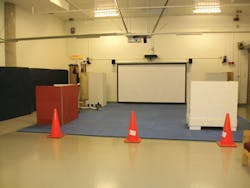We live in perilous, crisis-filled times. My generation had its share of problems, to be sure, but the immensity of what faces the current generation and the generations of tomorrow, demands we prepare our first responders with the best training possible. One of the ways we do that is to provide them with realistic academic courses and the ability to put what they’ve learned in the classroom into practical application. I’m aware of many facilities in our own nation that have cutting-edge technology to prepare public safety personnel for most emergency situations. The FBI Academy in Quantico, Virginia, the Federal Law Enforcement Training Center in Glynco, Georgia, the DEA Academy, also in Quantico, and, most recently, the College of DuPage, in Glen Ellyn, Illinois, all provide the latest and greatest training for present and future law enforcement (LE).
In many instances, colleges have undertaken the task of training those who intend to make a career in LE. The fact that one can get a degree in criminal justice/public safety is important for many reasons, not the least of which is that the individual receives a thorough understanding of what they are about to embark upon. The aforementioned training sites all have facilities that allow trainees to put their training to the test in simulated environments that closely replicate what they might face in the real world. The ability to have immersion-type training is invaluable. It allows the student and the instructor to make an informed decision regarding the student’s viability as a future first responder.
I recently toured a state of the art facility, La Cite collegiale, in Ottawa, Ontario. Our friends up north in Canada have not been sitting idly by as events of the world have unfolded in recent years. Like us, they recognize that LE training must evolve with the times, not simply be reactive, but training must anticipate future needs. According to the Canadian Occupational Projection System, by the year 2018, Canada will face the following shortages:
- 4,000 police officers and firefighters
- 4,000 security professionals
- 12,000 technical healthcare workers (including paramedics)
To address the projected shortfalls, La Cite collegiale (LCC) developed The 911 Institute. The LCC is the largest French language applied arts and technology college in Ontario. By consolidating emergency, protective, and security services training programs under one roof, The 911 Institute is capable of training more than 700 students per year.
I sat down with Professor Paul St-Onge, Chief Training Facilitator, Police Foundations Program, to discuss the impact of his brand new facility. Paul is a dynamic sincere administrator with a constant smile and welcoming demeanor. He’s proud of what he’s accomplished in putting together a stellar program few schools can compete with. His energy is infectious as he explains the various partnerships with community groups and government agencies that are already in place or about to be, and which will benefit both the school and the country.
Paul gave me a thumbnail sketch of the building and its academic programs, and then led me on a tour of his underground facility, which is comprised of two massive basements that allow for the following training:
- A police station with lockup, interrogation rooms, offices and dispatch
- A fire station
- A paramedic station
- Two training labs with ambulance modules for paramedics
- A lab equipped with high fidelity simulation mannequins
- Underground garage that allows vehicles to be brought in (fire trucks, ambulances, police cars)
- Two-story apartment for simulation for police, paramedics
- Firefighter training structure with configurable maze
All of the above training venues are equipped with mics and cameras so that every training evolution can be recorded and reviewed. Radio communications are real-time, and there are computer tablets available in vehicles and on-site locations so that there isn’t an inch of the training complex where movement cannot be documented audio and visually. And, training can be conducted in total darkness, an element of training which is rarely addressed at most facilities.
Paul pointed out that simmunitions training takes place in the Institute, complete with role players in realistically furnished rooms. There’s also a PRISim® Judgment Simulator in one of the underground garages. The simulation training room is large enough to accommodate a police cruiser which is parked inside, complete with computer terminal to dispatch the officer(s) to a specific assignment. The realism is amazing, and allows for trainees to start training in the vehicle, make a traffic stop, and then get involved with the scenario. That’s great training. Everything the trainee does is captured on camera and played back on a whiteboard for critique purposes.
That’s just the underground facility. Once the students are finished down below, the above ground classrooms afford the following:
- A 911 call center
- Command post
- A radioscopy lab housing weapons, substances and hazardous material detection systems
- Computer lab
- Moot courtroom facility
LCC is a complete first responder facility that is the paradigm for LE training in Canada. A deputy chief in the Ottawa Police Service commented that the college is their first source for discovering the next generation of bilingual police officers, ones who are already familiar with police work, as well as the city of Ottawa itself. The ability of students to train together, i.e., police, firefighters and paramedics, is invaluable. Each student will graduate with an awareness of what the other services require to do their job, and how they can best interact with each other to operate more efficiently, thus saving lives.
The 911 Institute is separate from the rest of the college. Therefore, students develop a sense of brotherhood and become more focused on their studies, knowing that when they graduate they will most likely enter into their chosen career. Physical standards must be met as well, and Paul pointed out that their fitness test is a nationally recognized standard that makes no distinction between male and female candidates, both sexes must pass the same test with no accommodations or modifications. This is something our country has been trying to do for ages.
I asked Paul about the first responder program, whether the students have any gripes or suggestions for improvement. His reply was that LCC ranks first among 24 Ontario colleges in student satisfaction, graduate employment rate and quality of services. That means Paul is definitely on the right track in preparing a future workforce to ensure Ontario’s citizens are well-protected.
To say I was impressed with La Cite collegiale would be an understatement. Having taught at the FBI Academy for six years, I have a good idea of what is needed to prepare people for a career in public service/law enforcement. LCC meets and surpasses the standards I would require to give students the best training possible. Paul St-Onge and his colleagues have set the bar very high for other training facilities—that’s a good thing. If you’d like to contact Paul, he’s at [email protected].
Stay safe, Brothers and Sisters!
Web Links:
- LET magazine Oct 2011
- La Cite collegiale
- LivSafe--Stay Aware, Stay Safe!
- Chicago Warriors Midnight Battles in the Windy City by John Wills
- Gripped By Fear by John Wills
About The Author:
John M. Wills spent 33 years in law enforcement as a Chicago Police Officer and FBI Special Agent (Ret). He is a Freelance Writer and Speaker whose third book, TARGETED, is now available online at Amazon and Barnes & Noble. Contact John through his website: www.johnmwills.com.
About the Author
John Wills
John M. Wills is a former Chicago police officer and retired FBI agent. He is a freelance writer and award-winning author in a variety of genres, including novels, short stories and poetry. John also writes book reviews for the New York Journal of Books, and is a member of the National Book Critics Circle. His new book, The Year Without Christmas, is available now. Visit John at: www.johnmwills.com.

